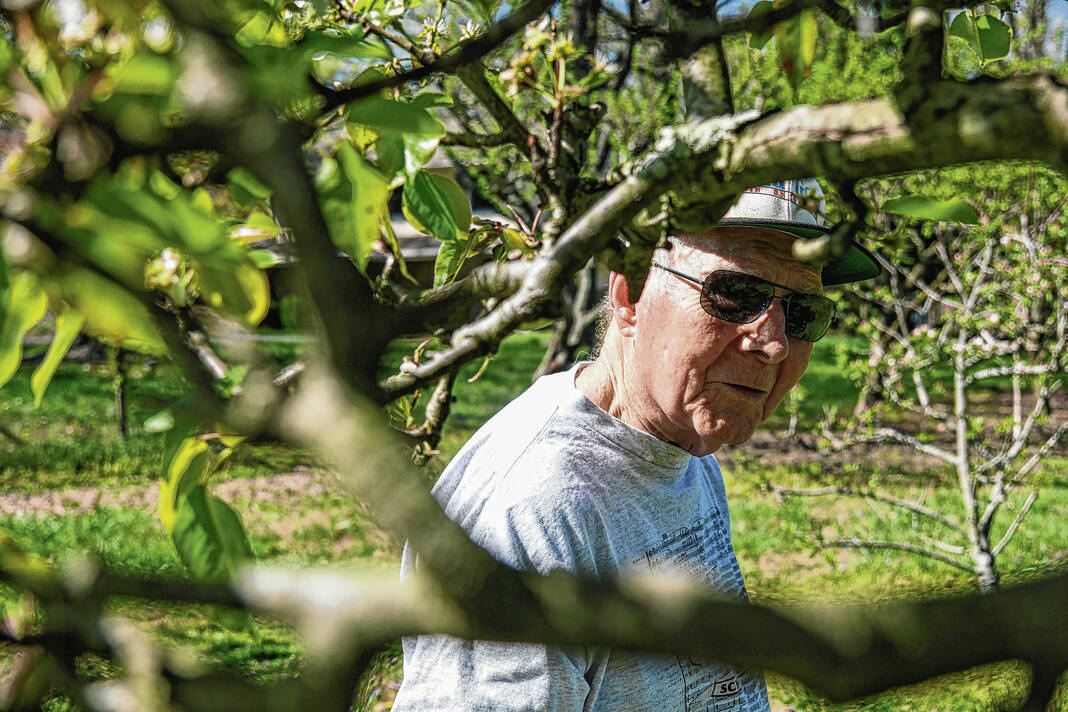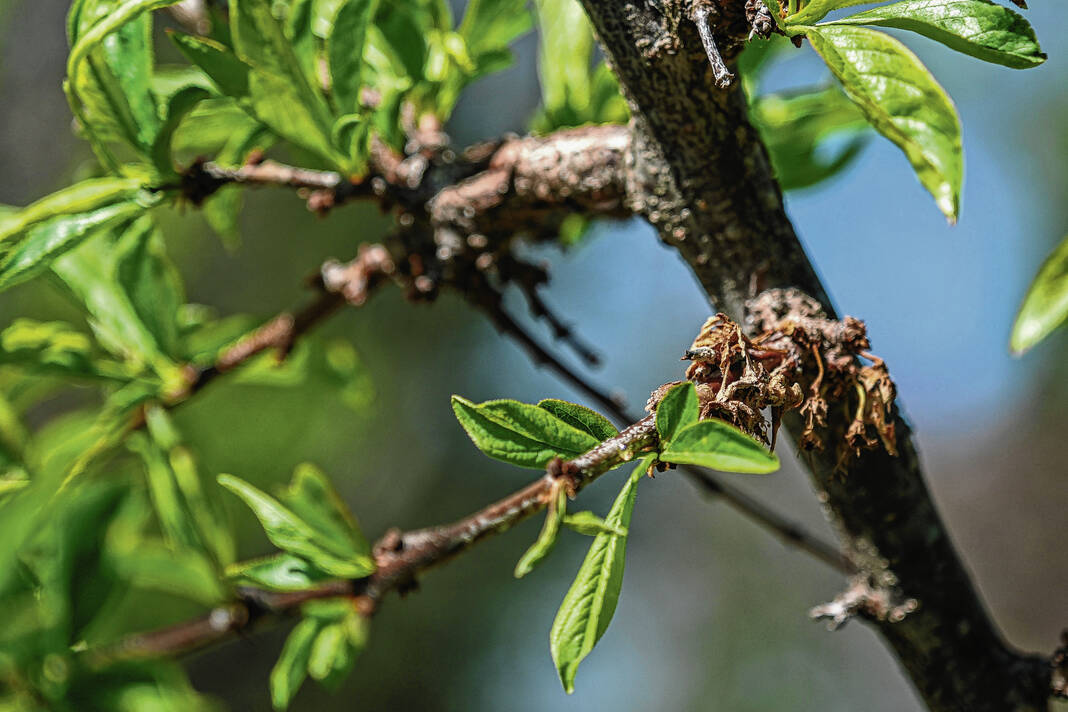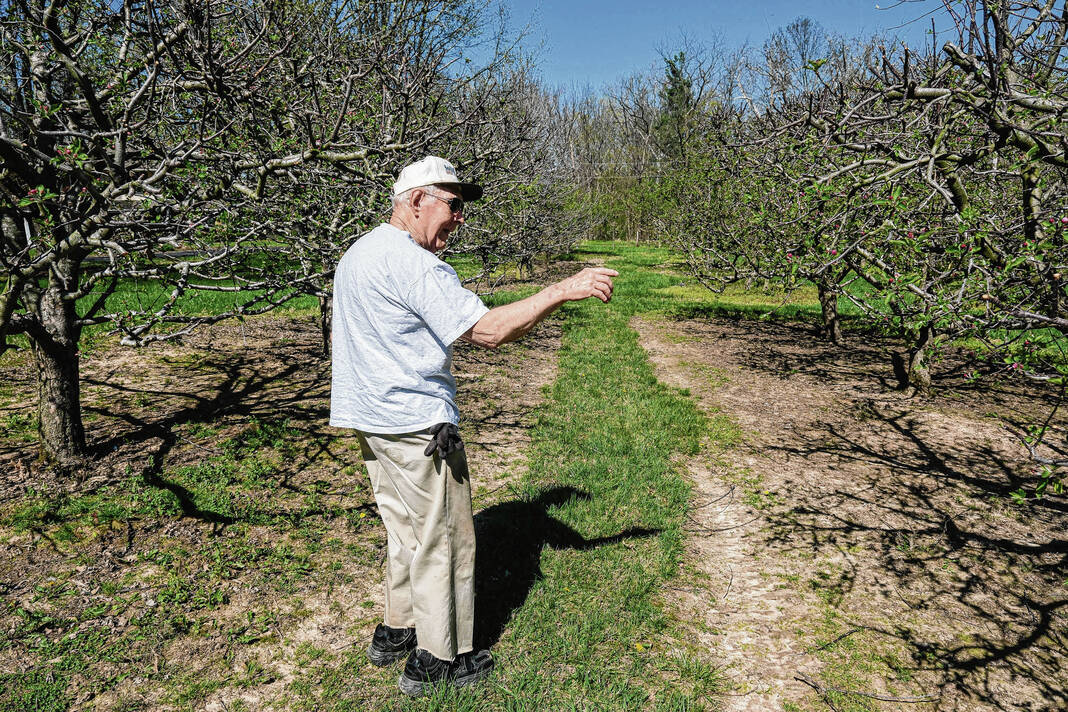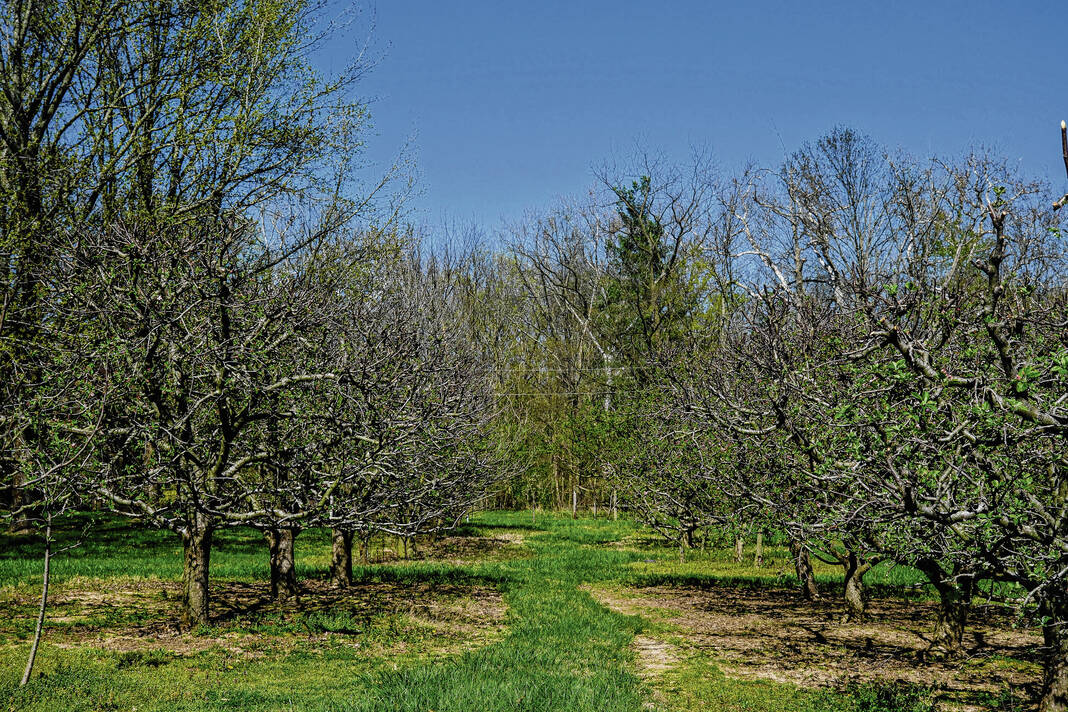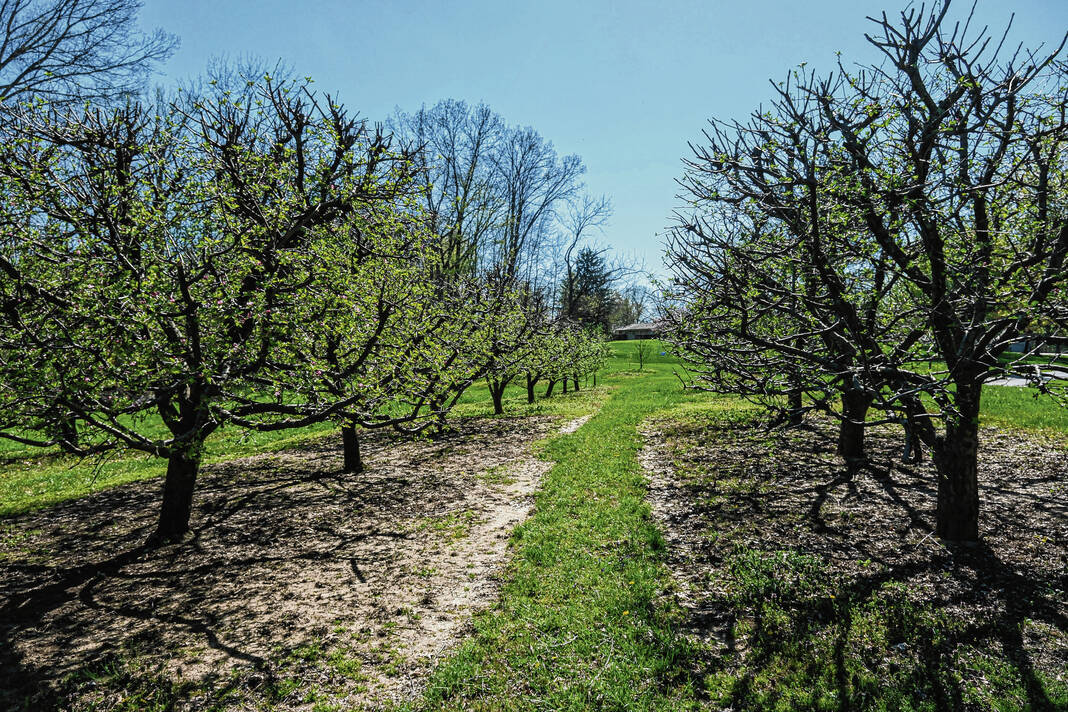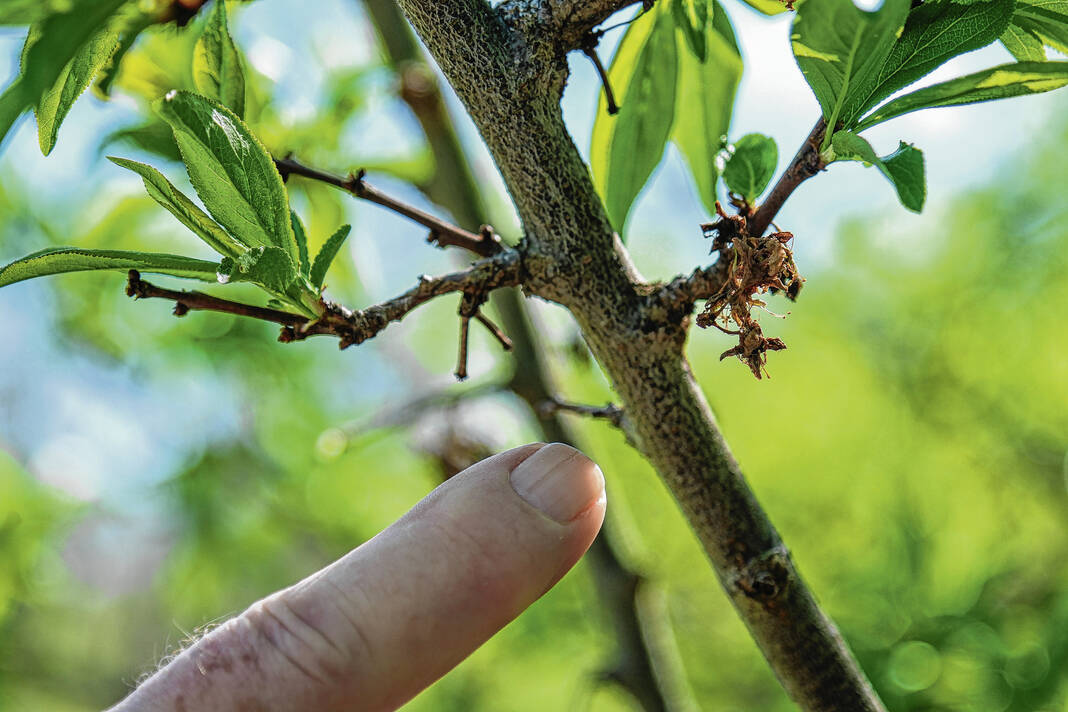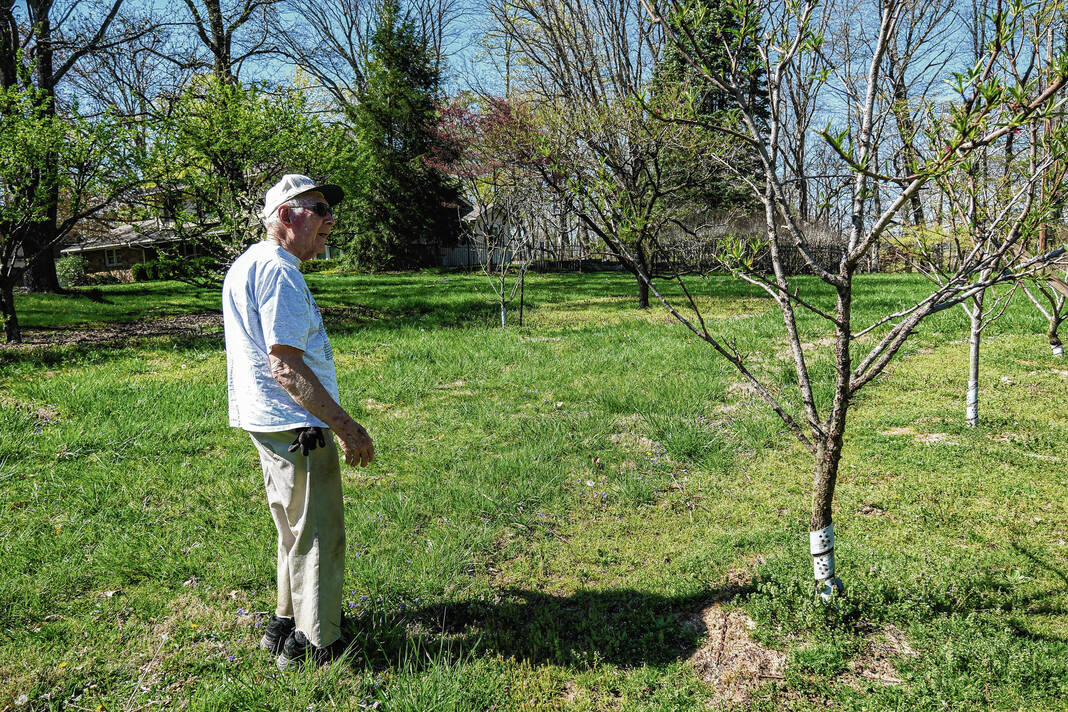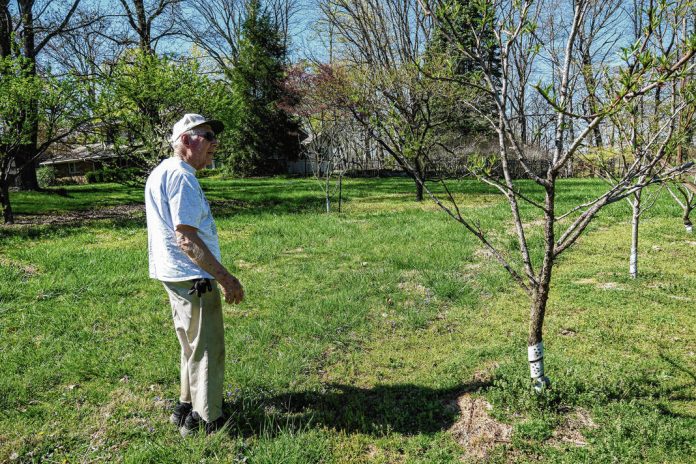
Mike Wolanin | The Republic Charles VanNatta looks at a peach tree damaged by a late frost after it bloomed in his orchard on his property in Columbus, Ind., Wednesday, April 12, 2023. A lot of his plum and peach trees won’t produce fruit this year VanNatta said.
As Earth Day approaches, some local officials say the effects of climate change are already in Bartholomew County and it’s time to adjust to a new reality.
“While we may be able to slow down climate change, we will not be able to reverse it, said Purdue Extension Bartholomew County agriculture and national resources educator Cora Reinbolt. “Our weather patterns will never go back to the way it used to be.”
In 2018, Purdue University released an impact assessment titled “Indiana’s Agriculture in a Changing Climate.” Many of the assessment’s most worrisome predictions were not expected to materialize until about 2050. However, a recent update indicates some of the worst impacts might arrive 10 years earlier than expected.
Spring rains will eventually result in more flooding, according to Amanda Shepherd, director of the Hoosier chapter of the Sierra Club. The Winding Waters group based in Columbus falls under Shepherd’s umbrella organization.
As the climate continues to shift, Shepherd says the warmer atmosphere will holds more and more water. An educator with a master’s degree in geology, Shepherd said that while Bartholomew County might not get as many rainy days and nights, the precipitation that does fall is likely to be heavier.
More of the signs are more subtle. In recent years, there have been many times when a late frost has damaged fruit crops, Reinbolt said.
An example can be seen at Chuck VanNatta’s orchard southeast of Petersville. When the temperature recently dropped below freezing, it wiped out his Japanese plums, VanNatta said. The arctic blast that hit Bartholomew County just before Christmas froze out his peach trees, he said.
But VanNatta is hopeful the frost that arrived this week in south central Indiana didn’t cause further damage.
“I don’t think Tuesday’s frost was heavy enough to hurt the blossoms on the apple trees,” VanNatta said. “But you never know until later.”
Climate change is also evident in the purple plants seen recently in local farmfields. While attractive, these plants are actually weeds that need to be eradicated, according to a Purdue newsletter. If they are not eliminated, the weeds will continue to grow and choke off the main crops, the newsletter states.
The weeds can usually be eliminated with a small amount of burndown herbicide before spring planting, Carter said. But farmers in our region have had difficult getting their equipment into their fields due to the rains. If the weeds grows large enough, more herbicide may be needed, she added.
However, Carter said she does not believe at this time there will be serious delays in planting.
Reinbolt says our energies should be focused on being flexible, adaptable, and keeping a positive mindset of sustainability and conservation.
“Protecting what we have is more important than feeling really bad about the bad choices we’ve made or the government made,” Reinbolt said. “Instead of spending a lot of times condemning and shaming, it’s better to try to start from square one, move forward and see what works for each individual’s farm, home or garden.”
It’s likely that south central Indiana will experience some warmer summers. That’s likely to reduce corn yields due to increased plant respiration and a decreased success of pollination, according to Purdue agricultural experts.
“But you can combat that by using different varieties that have shorter days to maturity, so the corn plants are doing their pollination prior to the hotter, drier and worst days of summer,” Reinbolt said.
Milder winters mean more surviving insects such as mosquitoes that are capable of carrying West Nile, malaria and Zika. Residents near Hope say they have already seen ticks this spring, which means incidents of Lyme disease transmissions may increase.
Many agricultural experts are concerned about fruit flies this year, Shepherd said. While fruit flies don’t sting or bite, they are capable of transferring diseases to surfaces and relocating E.coli from a contaminated source to fresh, ready-to-eat food, she said.
But Reinbolt adds there are ways to plant ahead and try to manage most of these pests.
“It may be late this season, but down the road, you can use conservation methods,” Reinbolt says.
Drainage tile, water percolation and improved organic material can improve the soil structure, the extension educator says.
“There are things you can do to improve the soil quality and soil health that might help extreme weather events from getting into the fields,” Reinbolt said. “Conservation practices would do that.”
One reason why many might reluctant to prioritize climate change is that Indiana’s weather has always been unpredictable, Shepherd said. That makes it difficult to prove that global warming should be a major concern.
“Climate is a much longer term thing than weather,” Shepherd said. “Weather can be so variable. It’s actually easier to predict climate patterns.”

